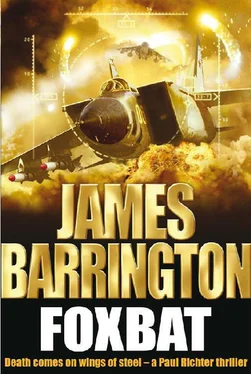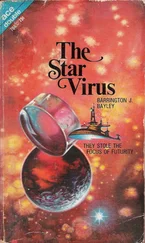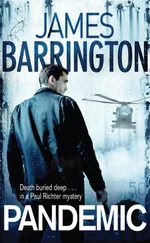And that was exactly what he had intended. The violent manoeuvre punched his aircraft away from the flight-path of the Acrid. Cutting the power and instantly changing the Harrier’s direction of flight as he’d done – a manoeuvre no other aircraft was capable of performing – virtually eliminated its infrared signature. But he’d had to leave it until the last possible moment, so that the Acrid wouldn’t be able to lock on to him again. As the Harrier started descending, Richter looked ahead, down towards the ground, and saw the missile powering past him.
The moment the target’s infrared return vanished, the missile’s seeker head began trying to reacquire the heat source. It didn’t detect the Harrier, but right in front of it was the massive exhaust bloom from the Scud missile, half a mile ahead. The Acrid’s computer is a fairly basic device, and its target discrimination isn’t particularly sensitive, so it immediately began tracking the new contact.
The Scud was still accelerating, but the Acrid was travelling at close to its maximum speed of Mach 4.5, and overhauled it rapidly. Less than three seconds after Richter kicked his Harrier into a dive, the seventy-kilogram high-explosive fragmentation warhead of the Acrid hit the rear of the Scud and detonated.
The result was spectacular. The remaining fuel in the Scud’s tanks exploded in a massive fireball, blowing debris in all directions.
MiG-25 Foxbat, callsign Zero Six, over Chiha-ri, North Korea
Malakov didn’t see the Acrid destroy the Scud. Though aware of the explosion, he assumed it was just his missile bringing down the British aircraft. He was now waiting for his second R-40T to lock on to the other Harrier but, unlike the first one, this pilot wasn’t making it easy. He’d stopped his climb almost as soon as Malakov identified him, presumably because his ECM fit had warned him he was being irradiated, and went back to low level where the Saphir radar was finding it hard to detect him.
The Russian pilot overflew Chiha-ri, then banked left to retrace his route. The Harrier had to be somewhere down below him. It was now just a matter of finding it.
Cobra One, over Chiha-ri, North Korea
Dick Long was looking for a way out, and a way past the Foxbat. The last Scud was already about five thousand feet above the ground and accelerating. There was no way his Harrier could catch it and, even if he could, he had no weapons left that could bring it down. And if he did climb up after it, the Foxbat would launch an Acrid and the Scud would be too high for Richter’s trick to work a second time.
That, he reflected sourly, was going to be the one that got away. Destroying five out of the six – even if the fifth one had needed a little help from a Russian missile – was still a remarkably good result. But he doubted if the residents of Seoul would agree with him when the sarin, or mustard gas, or botulinus toxin, or whatever the North Koreans had loaded inside the missile’s warhead exploded on the streets of the capital.
The Foxbat was the more immediate problem. The pilot was clearly looking for him, but by flying fairly slowly at very low level, now less than two hundred feet above the ground, Long believed the MiG’s radar wouldn’t be able to detect him. But then getting away from Chiha-ri clearly wasn’t going to be easy.
‘Cobra Two. You still here, Paul?’
‘Affirmative. I see the Scud, but where’s the Foxbat?’
‘Overhead Chiha-ri. I’m down in the weeds, south of the base, and he’s just overflown me, turning onto north. The anti-aircraft guns have stopped firing, which probably means more fighters are on their way. It’s time we got the hell out of here.’
Cobra Two, over Chiha-ri, North Korea
Then something totally unexpected happened. Richter was looking up through his canopy towards the accelerating Scud when a streak of bright light shot across the sky from somewhere to the east of his position and smashed into the missile, which instantly exploded.
‘What the hell was that?’ he demanded.
‘That, my friend, was an alpha india mike one two zero, better known as AMRAAM. The new voice on the Harriers’ discrete frequency was unmistakably American.
‘This is Cobra Leader. Identify yourself,’ Dick Long snapped.
‘This is Blade One, lead cab of eight Super Hornets from the Mobile Chernobyl. My colleagues are having an exchange of views with some MiGs a few miles east, but I thought y’all could use some help over here, that’s if you don’t mind me joining the party.’
‘Did you bring a bottle?’ Richter asked, levelling his Harrier three hundred feet above the ground and turning onto north.
MiG-25 Foxbat, callsign Zero Six, over Chiha-ri, North Korea
The explosion of the second Scud immediately attracted Malakov’s attention, and he looked up sharply through his canopy. It could, he supposed, have been some kind of a malfunction, though he knew the Scud was a generally reliable, if fairly inaccurate, missile. But the Russian didn’t believe in convenient malfunctions. He thought the weapon was far more likely to have been brought down by an air-to-air missile, presumably fired by the remaining Harrier. Or perhaps one of the Americans had done it.
‘Chunghwa, this is Zero Six. I’ve shot down one of the British fighters, but I’ve just seen a Scud missile explode shortly after lift-off. Where are the American aircraft now?’
‘About fifteen miles to the east of Chiha-ri, Zero Six. Wait. No, we now hold three contacts in your vicinity, two intermittent, probably at low level, and one solid.’
‘Three?’
‘Confirmed. The intermittent contacts are believed to be the British aircraft, so the other may be one of the American intruders.’
That couldn’t be right. He knew he’d shot down one of the Harriers – he’d seen the explosion. Chunghwa must be wrong, and there must be two American fighters in the area. He returned his attention to the radar display, and simultaneously began a right turn, back towards Chiha-ri. He still had three missiles, so he could handle two Yankees and the remaining Harrier, no problem.
But as he straightened up on north, his Sirena S-3M radar homing and warning system suddenly alerted him. He checked the readout: an APG-79 I-band radar on a bearing of zero eight two. That, Malakov knew, meant an American F/A-18, a much more dangerous opponent than a Harrier. But he also knew that on the first day of the 1991 Gulf War a MiG-25 had shot down an American Hornet – Iraq’s only air combat kill during the conflict.
He checked his weapons, engaged the ECM system, then pulled the Foxbat round in a right-hand climbing turn onto east, looking for a target.
Blade One, over Chiha-ri, North Korea
The Super Hornet’s APG-79 radar was suddenly flooded by spikes as the MiG-25’s ECM equipment blotted out the picture, and simultaneously the ALR-67 Radar Warning Receiver conveyed the unmistakable message that the aircraft was being irradiated by a Fox Fire radar.
The pilot immediately engaged full counter-measures, but that didn’t seem to have any effect. He’d heard about the sheer power of the Foxbat’s radar and its ability to ‘burn through’ any ECM system, but this was the first time he’d seen it in action. And it frightened him, because he’d no clue where the Russian-built aircraft currently was. Without his radar, he was both blind and effectively unarmed.
‘Cobras, Blade One.’ The American’s voice was noticeably louder and sounded more stressed than his previous transmissions. ‘I’m being irradiated and jammed by this guy, and I can’t get a lock on him. Turning away and streaming a decoy.’
Читать дальше












